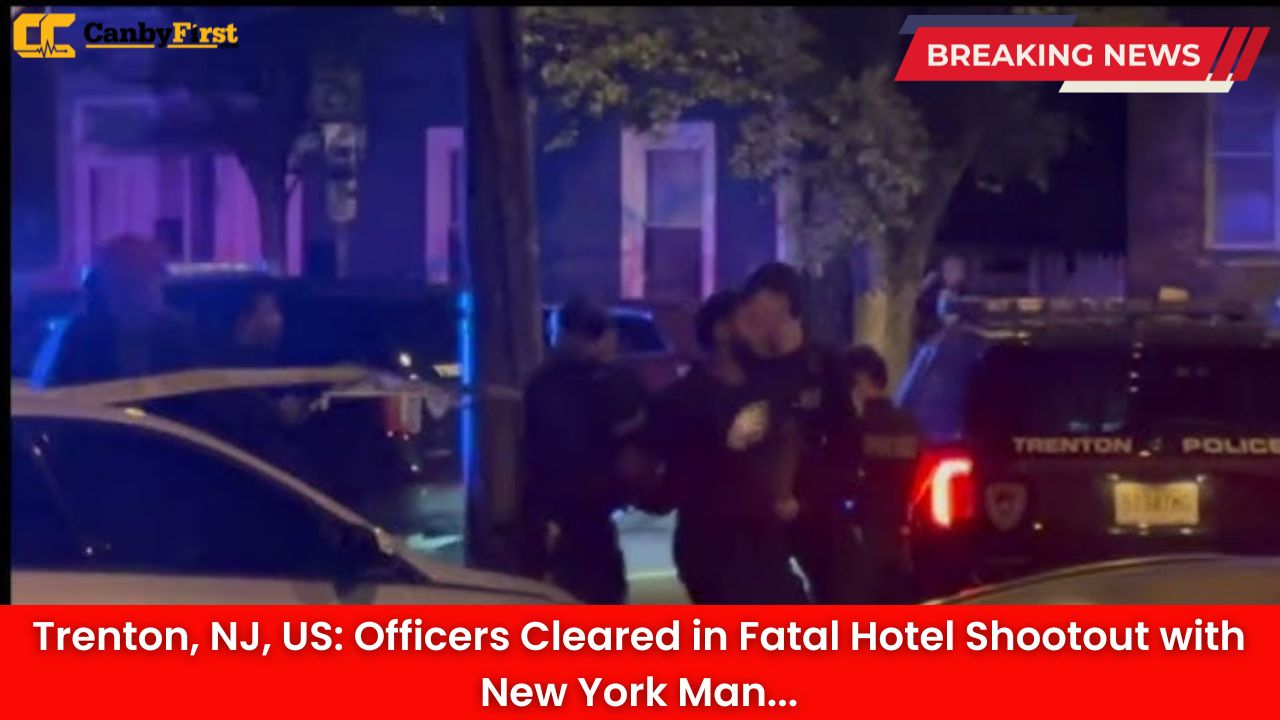Trenton, NJ, US: In a decision announced Friday, county prosecutors determined that two state troopers involved in a deadly shootout with a New York man at a suburban New Jersey hotel last year will not face criminal charges. The dramatic confrontation left 38-year-old Marcus Reynolds dead and touched off intense public debate over use of force by law enforcement.
Shootout Unfolds at Middletown Inn
On the evening of June 12, 2024, Troopers Olivia Grant and Erik Morales responded to a 911 call reporting a man brandishing what appeared to be a firearm in the lobby of the Middletown Inn, a mid-price chain hotel. Surveillance footage later released by authorities shows Reynolds pacing near the front desk, visibly agitated, before producing a silver-handled pistol. When troopers arrived, witnesses said Reynolds fired a shot into the ceiling, shattering light fixtures and sending guests diving for cover.
Trooper Grant issued multiple commands for Reynolds to drop his weapon. Instead, Reynolds advanced toward her and Morales, firing again. Both troopers returned fire. The exchange lasted mere seconds but left Reynolds mortally wounded in the hotel corridor. He was pronounced dead at the scene. No other individuals, including guests or hotel staff, were injured.
Also Read
Investigation and Legal Review
The New Jersey Office of Public Integrity and Accountability (OPIA) took the lead in analyzing the shootout, interviewing more than two dozen eyewitnesses, reviewing ballistic evidence, and examining the hotel’s security recordings. Prosecutors faced a high bar: demonstrating beyond a reasonable doubt that either officer’s use of lethal force was unlawful.
Key findings in the OPIA report included:
-
Reynolds fired at officers first, striking a decorative ceiling panel inches above Coordinator Morales’s head.
-
Byrne ballistics established that both troopers’ shots were aimed at Reynolds’s torso.
-
Expert testimony concluded the officers reasonably believed Reynolds posed an imminent threat to both themselves and bystanders.
After months of meticulous review, Monmouth County Prosecutor Sandra Liu announced that while the outcome was tragic, the troopers acted within the scope of their constitutional authority. “Under New Jersey law, an officer may use deadly force when confronted with a suspect who poses an immediate risk of serious bodily harm or death,” Liu stated. “The evidence clearly supports that standard in this case.”
Family and Community Reaction
The Reynolds family criticized the decision, with his sister, Tasha Mitchell, calling it “a grave injustice.” “Marcus was struggling, yes, but he didn’t deserve to die,” Mitchell said in an impassioned news conference. “We will continue to seek accountability and reform to prevent others from meeting the same fate.”
Several community advocacy groups rallied outside the Monmouth County courthouse, demanding increased transparency in police-involved shootings. Some organizers pointed to Reynolds’s documented history of mental health challenges and treatment non-compliance, arguing that better crisis-intervention protocols might have avoided the deadly showdown.
Departmental Changes and Training Upgrades
In the wake of the incident, the New Jersey State Police announced enhanced de-escalation and crisis-intervention training statewide. The revised curriculum includes:
-
Scenario-based drills focusing on mental health crises.
-
Mandatory crisis-intervention team (CIT) certification for all patrol units.
-
Expanded use of nonlethal tools, such as beanbag rounds and tasers, with specialized guidelines on deployment.
Colonel Jason Harper, superintendent of the State Police, emphasized that these measures seek to reduce the likelihood of future lethal outcomes. “We honor the troopers who faced a life-threatening situation,” Harper said, “and we commit to equipping every officer with the skills to resolve encounters safely.”
Broader Implications for Law Enforcement
The verdict underscores the legal protections afforded to officers under state self-defense statutes. New Jersey joins other states where prosecutors have cleared law enforcement personnel in on-duty shootings after concluding the use of force met constitutional standards.
Legal experts note that such rulings often spark calls for legislative reform. “When an officer’s decision is judged legally justified but still ends in loss of life, it reveals a tension between statutory authority and public expectations,” said Prof. Diane Alvarez, a criminal-justice scholar. Advocates are urging lawmakers to refine use-of-force laws and bolster accountability mechanisms, including independent review boards with subpoena power.
Looking Ahead
While the troopers will not face legal jeopardy, the tragic outcome spurred statewide efforts to refine police-community engagement and crisis-response strategies. For the Reynolds family and concerned residents, the focus now shifts to systemic reforms aimed at preventing similar tragedies—ensuring individuals in mental health crises receive help rather than facing armed confrontation.
As New Jersey law enforcement agencies adopt new protocols and training enhancements, all eyes will remain on whether these changes translate into safer outcomes for officers, individuals in crisis, and the public at large.












